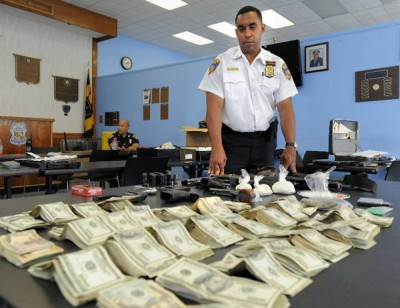
Image source: Baltimore Sun
Simply carrying a large amount of cash in a grocery sack in your car is now sufficient grounds for a police officer to seize your money, a US circuit court has ruled. A panel of the Eighth US Circuit Court of Appeals found that all a deputy has to do to seize cash from a person is say it is drug money.
The court refused to return the $63,530 that Deputy Dave Wintle seized from a disabled veteran named Mark A. Brewer during a traffic stop in 2011. Brewer was never charged with a crime or even given a traffic ticket. Yet the decorated Air Force veteran lost his savings when a drug-sniffing dog smelled marijuana on it, even though no cannabis was found in Brewer’s car or his home.
Brewer saved the money from disability payments and his Air Force pay — as documents deputies found in the car indicated. He said he was traveling to Los Angeles to visit his uncle and to use the money as a down payment for a house. He added he was hoping his uncle could help him get a job there.
“The record here does not make clear whether the seized currency constitutes property used to facilitate a drug offense or proceeds from a drug offense,” Judge Bobby E. Shepherd wrote in a March 23 opinion upholding the seizure. “For the purposes of analysis, however, we will assume that the currency facilitated a drug offense and is thus subject to [to be seized].”
It was taken through a legal mechanism called civil forfeiture. (Listen to Off The Grid Radio’s report on civil forfeiture here.)
How To Hide Your Guns, And Other Off-Grid Caches…
Brewer’s ordeal began when he was driving through Douglas County, Nebraska, outside of Omaha on Interstate 680 in November 2011. Wintle, a Douglas County sheriff’s deputy, pulled him over for not signaling when he made a lane change, and then Wintle asked for permission to search the vehicle.
Keeping Cash in a Grocery Bag Can Lead to Seizure
Wintle had just run a background check on Brewer and found he had “no major violations” on his record when he had the dog search the car. The search was apparently prompted by Wintle’s discovery of $1,000 in cash in Brewer’s pocket. He then found the other money in grocery sacks in a backpack.
Wintle claimed that copies of articles in the car about making hash and weed oil constituted evidence that Brewer was a drug dealer.
“The government provided sufficient circumstantial evidence to support the finding of a substantial connection between the currency and drug activity,” Shepherd wrote.
Among the circumstantial evidence was:
- The money was kept in plastic grocery bags in a backpack in Brewer’s trunk.
- The money was bundled into batches of $1,000 that were kept together by rubber bands.
- Brewer initially told Wintle that he did not have enough money to pay for a motel room and that he was sleeping at rest stops.
- Wintle claimed he smelled marijuana on the backpack.
- The articles.
The federal government initiated seizure against Brewer, who appealed. During a civil trial U.S. Magistrate F.A. Gossett upheld Wintle’s action. Brewer appealed that ruling to the Eighth Circuit Court. Shepherd was part of a three-judge panel that upheld Gossett’s decision.
Brewer served in the Air Force as a weapons specialist and military policeman. He was given a medical discharge after a deployment in Afghanistan in 2008, Nick Sibilla of the Institute for Justice stated in a Forbes op-ed piece. Brewer says he has Post-Traumatic Stress Disorder (PTSD).
Even more tragic: The ruling will have a wide impact.
“This court case will be the ‘law of the circuit’ for Arkansas, Iowa, Minnesota, Missouri and North and South Dakota as well, creating even more barriers for Americans to fight back against unjust seizures in court,” Sibilla wrote.
New Mexico Eliminates Seizure
Meanwhile, New Mexico has become the second state to effectively eliminate the use of civil forfeiture and seizure by law enforcement. The state legislature passed and Governor Susana Martinez signed House Bill 560, which is designed to curb the practice. It still will allow the criminal forfeiture of property, although that legal barrier is much higher for the government.
A well-known critic of seizure hailed the bill as a victory for property rights.
“This is the first time in decades that a state legislature has taken the bold but necessary step to put an end to the perverse financial incentive in civil forfeiture laws,” Scott Bullock, the attorney in charge of the Institute for Justice’s battle against the practice, stated in a press release. “Thankfully, Governor Martinez and the New Mexico legislature recognized that no one should lose their property without being first convicted of a crime.”
Do you believe the veteran should have received his money back? Share your opinion in the section below:
7 Unexpected Ways The Government Is Tracking Your Every Move. Read More.
 Off The Grid News Better Ideas For Off The Grid Living
Off The Grid News Better Ideas For Off The Grid Living


